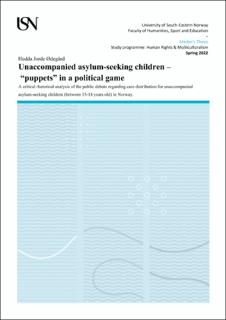Unaccompanied asylum-seeking children – “puppets” in a political game
Master thesis
Permanent lenke
https://hdl.handle.net/11250/3007965Utgivelsesdato
2022Metadata
Vis full innførselSamlinger
Sammendrag
Proposition 82 L on “Amendments to the Immigration Act (legalization of the responsibility of care for unaccompanied minors living in asylum reception centers) initiated a larger debate where the Ministry of Justice and Public Security wanted to provide UDI with the main responsibly for unaccompanied asylum-seeking children’s care. The Proposition received a lot of criticism.
This research investigates, through the aforementioned Proposition, how the different rhetors dealt with the question of who was the most capable institution taking care of unaccompanied asylum-seeking children between 15-18 years old in Norway. The thesis further examines the theory of recognition and how the different rhetors had used this concept, as it is a crucial part of care. To answer these questions a critical rhetorical analysis was used as a methodological approach to uncover strategies, content, as well as motivations from the rhetors. Analyses have been done on three texts taken from the public debate to gain a varied insight from both sides of the discussion.
The findings indicate that there were two different perspectives and ways of perceiving children’s needs and distribution of care. The rhetors’ use of rhetorical approaches also demonstrated that they had quite different ways of getting their points across. Results show that the more engaged you are in the topic, the stronger and clearer the rhetoric appears. I argue that one side was considering the best interest of the child connected to the Convention on the Rights of the Child, while the analyses further exposes that the other side placed more emphasis on the structures and efficiencies surrounding the receptions centers. The children’s opinions were not heard or mentioned by any of the parties, and the children appeared as “puppets” in the political game. It raises the question as to whether UDI being in charge of the children’s care is in the best interest of the child or the system.
Keywords: unaccompanied asylum-seeking children, Proposition 82 L, care, recognition, debate, critical rhetorical analysis, best interest of the child, Convention on the Rights of the Child, reception center, UDI, Child Welfare System
